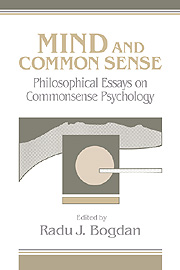Book contents
- Frontmatter
- Contents
- List of Contributors
- 1 The Folklore of the Mind
- 2 Analysis without Noise
- 3 Folk Psychology and the Explanation of Human Behavior
- 4 Methodological Reflections on Belief
- 5 Consciousness and Content
- 6 The Inevitability of Folk Psychology
- 7 How is Eliminative Materialism Possible?
- 8 The Long Past and the Short History
- 9 Common Sense Naturalized: The Practical Stance
- Index
8 - The Long Past and the Short History
Published online by Cambridge University Press: 24 September 2009
- Frontmatter
- Contents
- List of Contributors
- 1 The Folklore of the Mind
- 2 Analysis without Noise
- 3 Folk Psychology and the Explanation of Human Behavior
- 4 Methodological Reflections on Belief
- 5 Consciousness and Content
- 6 The Inevitability of Folk Psychology
- 7 How is Eliminative Materialism Possible?
- 8 The Long Past and the Short History
- 9 Common Sense Naturalized: The Practical Stance
- Index
Summary
Introduction
Is commonsense psychology a scientific theory? It seems accepted dogma today that it is, even if many regard it as a rudimentary or fledgling scientific theory, or as a very inadequate or degenerating theory, one that needs to be rejected and supplanted.
The dogma sets up a broad trichotomy amongst those who share it. There are those who think that commonsense psychology is basically all right, but that it could and should be improved, tightened up, made respectable; there are those who think that it can never attain the status of a “proper” theory, but that we are stuck with it; and finally there are those who ask us to reject it root and branch – to “eliminate” it – and to opt instead for something quite different: maybe a pot of gold at the end of a future neuroscientific rainbow. To illustrate the first, Fodor wrote recently: “We have no reason to doubt that it is possible to have a scientific psychology that vindicates commonsense belief/desire explanation” (1987, p. 16); for Fodor, commonsense psychology, improved and strengthened, could become respectable. Scholars such as Davidson, however, have hefty reservations about its scientific possibilities. And third, both the Churchlands seem to regard commonsense psychology as the main albatross around the necks of those trying to develop a science of cognition and behaviour.
In several places I have tried to argue against this dogma.
- Type
- Chapter
- Information
- Mind and Common SensePhilosophical Essays on Common Sense Psychology, pp. 144 - 160Publisher: Cambridge University PressPrint publication year: 1991
- 2
- Cited by

